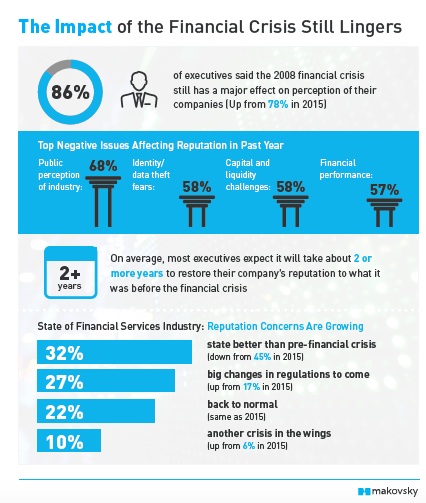
This post appears courtesy of Makovsky. The full study can be found here.
Nearly a decade has passed since the 2008 financial crisis, but its impact remains present in the minds and balance sheets of consumers and industry alike. Just as many consumers are still in the process of rebuilding the wealth lost during the crisis and its resulting recession, many financial services companies are still in the process of rebuilding their reputations. They are grappling with a poor industry image, continued consumer mistrust and revenue losses, not to mention regulatory and compliance problems. The 2016 Makovsky Wall Street Reputation Survey found financial service executives are focusing their rebuilding efforts around three key stakeholder groups: consumers, employees and financial regulators.

Due to these lasting effects of the financial crisis, 27 percent of consumers have lost trust in the financial services industry, while 91 percent are concerned that another financial crisis could happen in the future. Another major concern for many consumers is cybersecurity. Eighty-six percent of U.S. consumers said they would be likely to switch financial institutions due to data breaches. For many consumers, the ability for a large financial institution to be able to combat a security threat is a major key to building a strong reputation. In order to rebuild trust with the consumer market, consumers say they would like to see more transparency, more personalized customer service and they would like to see companies follow regulations more closely.
Employees’ perceptions also play a role in building the reputation of a company. Seventy percent said negative employee perceptions of the company and its products and services can be a concern to upholding the reputation of that company. To address the concern of negative employee perceptions, companies have implemented employee recognition programs, increased employee communication and increased their social media usage. Social media allowed companies to engage a younger audience, project a more transparent culture, communicate with employees about company news and more. More than half of those surveyed said employee satisfaction is very important to improving their company’s reputation over the next year.
Financial regulators also play a role in strengthening or damaging reputation. Most executives believe that more regulation will improve reputations and trust with consumers more quickly, however, many executives also believe non-compliance with regulation will pose a challenge to building a strong reputation. There is also a concern where an increase in complaints on a company to the Consumer Financial Protection Bureau could pose a threat to reputation.
With the findings of this survey, financial service institutions can understand that American consumers do not view the market the same way as they did before the 2008 financial crisis and they can target their reputation building efforts on the proper audience to rebuild the trust they need in order to be successful.
The Makovsky Wall Street Reputation Survey is a compilation of 228 interviews with executives and managers at large and mid-sized publicly traded and private financial service institutions. A random sample of 1,079 U.S. consumers were also surveyed. Makovsky is one of the nation’s largest and most influential independent integrated communications firms.
 Jordan McCrary is a public relations student at the University of Florida. She is the Vice President of the UF PRSSA Chapter. Follow her on Twitter @mccrary_jordan.
Jordan McCrary is a public relations student at the University of Florida. She is the Vice President of the UF PRSSA Chapter. Follow her on Twitter @mccrary_jordan.



